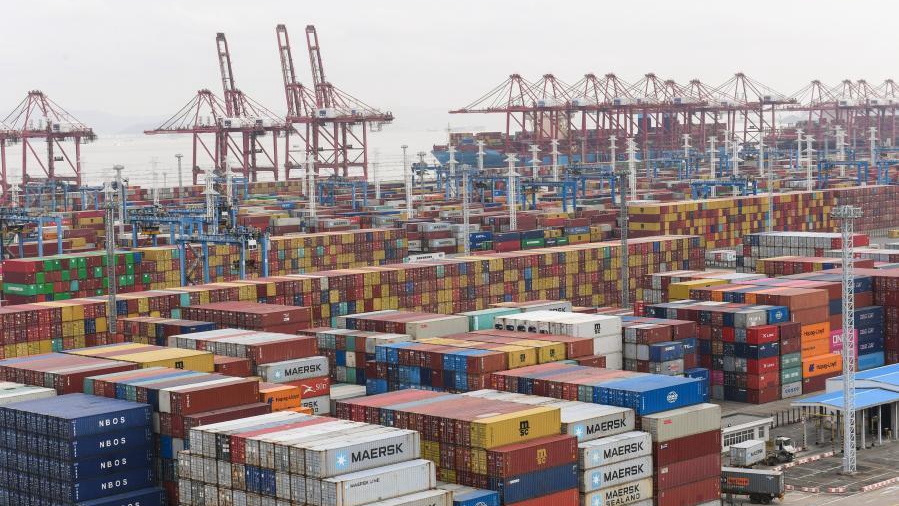
The Shanghai Oriental Pearl Tower in Shanghai, China, February 10, 2022. /CFP
The Shanghai Oriental Pearl Tower in Shanghai, China, February 10, 2022. /CFP
Editor's note: Daryl Guppy is an international financial technical analysis expert. He has provided weekly Shanghai Index analysis for media for the Chinese mainland for more than a decade. Guppy appears regularly on CNBC Asia and is known as "The Chart Man." He is a national board member of the Australia China Business Council. The article reflects the author's opinions and not necessarily those of CGTN.
Remember geo-locks on DVDs? They prevented a DVD purchased in Asia from being played in the U.S. or Australia. Inventive techies found ways around this. Personally, I purchased a DVD player in Singapore and it sat alongside my Australian DVD player so I could view DVDs from either location.
For a while, times changed and this technological incompatibility converged towards common standards and interoperability. That sweet spot of technological convergence is now disintegrating and it threatens to take global productivity back to the days when multiple DVD players were necessary.
The new threat comes in two policies. The first policy is the attempt to "build out" China from participation in setting global standards. The second policy is to "build China out" of products by restructuring supply chains. Neither of these is an admirable objective, and potentially, neither of these is an achievable objective although the attempt will cause considerable irritation and inconvenience.
The "build out" policy includes forcing other economies to adopt product and operating standards defined only by Western nations. This includes trade settlement and currency transfer procedures. It also includes a rejection of any China operating standards and equipment.
We already see the beginnings of this in relation to 5G and artificial intelligence. The action taken by the United States against Huawei is a portent of broader Western intentions to cripple Chinese economic activity. Australia forced the Solomon Islands to abandon the installation of a subsea internet cable by Huawei. The intended result is to again divide the world into technical geo-lock enclaves dominated by the United States.
The "build China out" policy is a supply chain issue that aims to remove China products and processes from the supply or product component chain. This flies in the face of economic reality because it undermines the very foundations upon which so many successful American companies are built. For example, Apple's profits depend on high-quality China assembly processes; Walmart's success now depends on thousands of product lines sourced from China and millions of customers benefit from this price competition.
A reduction in reliance on single-source supply chains may be a prudent business decision, but a policy of building China out of supply chains is neither prudent nor achievable.
The unintended outcome of these approaches is to lower the living standards of the countries who take this route. The deflationary impact of China's contribution to the world economy cannot be underestimated. This is no longer a matter of cheap labor. The rise in China's product quality and subsequent contribution to economic productivity underpins the growth of the Western economy. This result is best observed in the growth of cheaper but more powerful computers.

Zhoushan Port in Ningbo, Zhejiang, China, March 3, 2021. /CFP
Zhoushan Port in Ningbo, Zhejiang, China, March 3, 2021. /CFP
The boost to productivity delivered by cheaper products – be they the tradesman's power tools, or the software driving the professional's computers – cannot be ignored. Remove the contribution of these components from the economy by making them more expensive and you have a recipe for loss of productivity and an increase in inflation.
The political attempts to sabotage the Chinese economy fail to understand the power of the consumer in the modern global economy. Chinese products and components are so integrated into supply chains that any removal will create a consumer backlash with political consequences.
Additionally, the consumer society extends beyond the cabal of developed Western nations and now includes developing and emerging economies in Asia and Africa. Many of these economies have been a traditional source of commodities for the developed Western economies and they are rarely considered as a priority destination for Western goods. This ignores the growing consumer demand in these countries that is increasingly met by Chinese goods, services, products and technical standards. The largest consumer markets in the world are no longer located in Europe and the U.S.
Western countries may have some limited success in "building out" China but the global consumer economy is much larger than just these Western populations. Despite this attempt to isolate China, the future will see an inevitable reconvergence of technical and trade settlement standards driven by consumer demand and they will have Chinese characteristics.
Twenty years ago the old-style DVD players were often physically hacked to overcome the geo-locks. Consumer demand eventually forced a convergence of international standards in everything from USB plugs to cell phones. Reactionary political attempts to push the clock back to a world again divided by technical standards will be met by consumer resistance enhanced by an integrated global economy.
Progress, by definition, moves forward and China is incontrovertibly part of the vanguard. The best standards for the global digital economy are those developed in cooperation for a world where the U.S. and China are able to competitively coexist because you cannot geo-lock China out of the global economy.
(If you want to contribute and have specific expertise, please contact us at opinions@cgtn.com. Follow @thouse_opinions on Twitter to discover the latest commentaries in the CGTN Opinion Section.)

